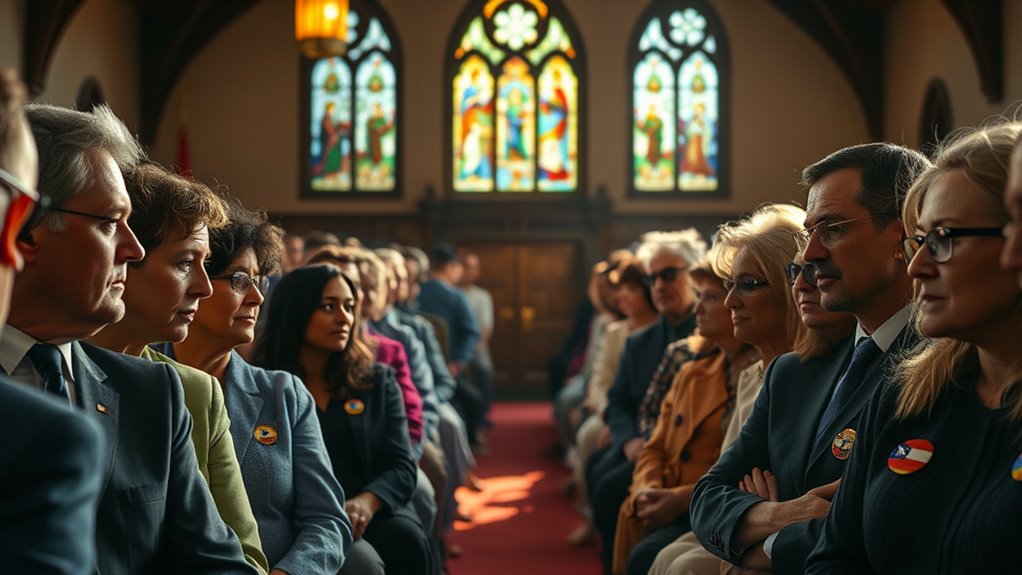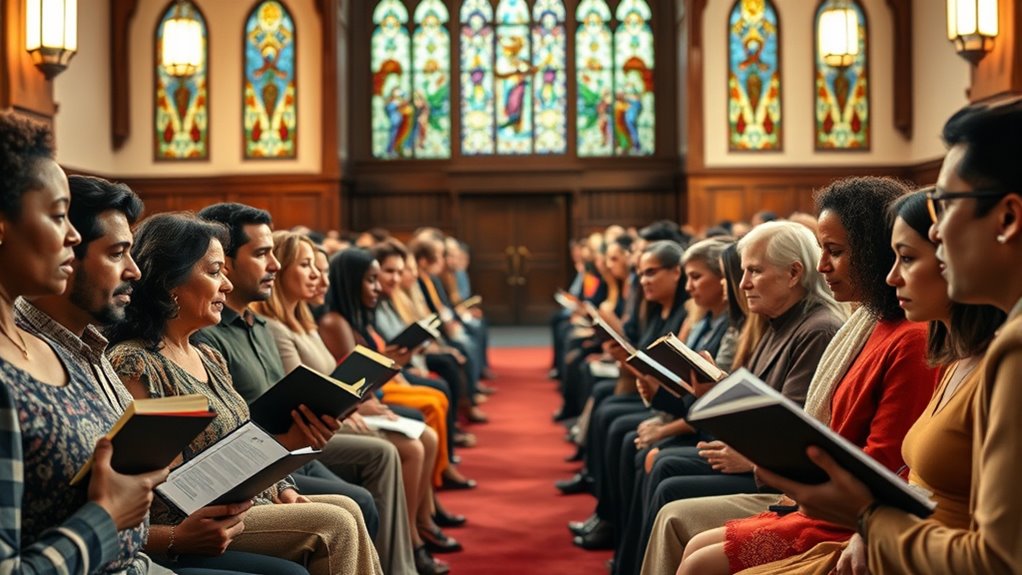Guiding political polarization in your church community requires grounding in biblical principles of love, humility, and unity. Focus on shared spiritual values and remind members that their primary identity is in Christ, not politics. Foster open dialogue and practice active listening to promote understanding. Encourage actions like prayer, community service, and Scripture study to reinforce bonds. By centering your approach on faith, you can help your community stay united despite political differences. Keep exploring how faith can bridge divides.
Key Takeaways
- Emphasize biblical principles of love, humility, and unity to foster understanding amid political differences.
- Create open, respectful dialogue spaces that encourage listening and patience over judgment.
- Remind community members that their primary identity is in Christ, not political affiliations.
- Incorporate faith-centered activities like prayer and service to reinforce shared spiritual purpose.
- Use scripture to seek wisdom and maintain focus on Christ’s message of love and reconciliation.

Political polarization has increasingly seeped into church communities, challenging the unity and shared purpose that once defined them. As members of a faith community, you’re often called to embody love, understanding, and humility. Yet, during times of heated political debate, it can feel like these foundational values are pushed aside. The divide isn’t just about differing opinions; it’s about how those differences threaten the very sense of faith-based unity that binds you together. To navigate this, you need to turn to scriptural guidance, which offers timeless principles on unity, respect, and compassion. The Bible emphasizes the importance of love and humility over division and judgment. For example, 1 Corinthians 1:10 urges believers to be united in mind and judgment, emphasizing that Christ calls us to prioritize our shared faith over political differences. Recognizing that everyone in your community is on a spiritual journey helps you approach disagreements with patience and grace, rather than hostility or defensiveness. Cultivating an attitude of color accuracy can help foster understanding and reduce misunderstandings during tense conversations.
Fostering faith-based unity requires intentional effort. It’s essential that you remind yourself and others that your primary identity is rooted in Christ, not political affiliation. When conversations become contentious, steer them back towards shared spiritual values. Focus on common ground, such as compassion, justice, and humility—values that transcend political lines. It’s also helpful to create space for open dialogue where differing opinions are welcomed, but always rooted in respect and love. This means listening more than you speak, seeking to understand rather than to win arguments. Scriptures like James 1:19 highlight the importance of being quick to listen and slow to speak, encouraging a posture of humility and patience.
Additionally, you can reinforce unity by actively participating in community service or prayer groups that emphasize common goals beyond politics. These activities remind everyone that faith calls you to serve others and seek reconciliation, not division. When disagreements arise, turn to prayer and scripture to guide your responses. Pray for wisdom and discernment, asking God to help you maintain love and unity despite differences. Remember, your faith is a powerful foundation that can bridge divides. By anchoring your actions in scriptural guidance and prioritizing faith-based unity, you help your church community stand firm against the divisive currents of politics. In doing so, you uphold the core message of Christ’s love—an invitation to unity, compassion, and shared purpose that transcends any political divide.
Frequently Asked Questions
How Can Church Leaders Effectively Mediate Political Disagreements?
You can effectively mediate political disagreements by fostering open, respectful dialogue rooted in faith and politics. Encourage members to listen actively and understand differing perspectives, emphasizing shared values over division. Set clear boundaries to prevent heated debates and remind everyone of their common purpose. By promoting unity through faith-based discussions, you help bridge divides, reduce polarization, and nurture a more inclusive community where dialogue fosters understanding rather than division.
What Are the Signs of Deep Polarization Within a Congregation?
You notice silent treatment during services and heated debates spilling into small groups—that’s a sign of deep polarization. Faith division becomes evident as members choose sides, ignoring shared values. When conflict escalation occurs, trust erodes, and unity fractures. These signs reveal underlying tensions, signaling it’s time to address the issues honestly. Recognizing these warning signs early helps you restore harmony before the divide widens beyond repair.
How Does Political Polarization Affect Church Growth and Outreach?
Political polarization can hinder your church’s growth and outreach by creating divisions that limit community engagement. When members are divided, it’s harder to unite around faith-based initiatives, reducing participation and support. This fragmentation discourages newcomers and isolates existing members, making outreach efforts less effective. To counteract this, focus on fostering open dialogue and emphasizing shared faith values, which can rebuild trust and strengthen community bonds.
What Role Does Scripture Play in Bridging Political Divides?
Scripture plays a crucial role in promoting unity and faith reconciliation amid political divides. By focusing on God’s word, you can remind your community that love and understanding transcend partisan lines. Emphasizing scripture’s message of compassion and grace helps foster respectful dialogue, encouraging members to see beyond political differences. Ultimately, scripture guides you toward unity, helping your church become a place where faith reconciliation overcomes division and nurtures genuine community.
How Can Church Communities Foster Unity Despite Political Differences?
You can foster unity despite political differences by emphasizing faith and dialogue within your church community. Encourage open conversations where everyone feels heard and respected. Focus on shared values rooted in faith, and promote unity-building activities that bring people together beyond political lines. By creating a safe space for honest dialogue, you help members see each other’s perspectives, strengthening bonds and reinforcing the core message of love and understanding that unites your church.
Conclusion
Guiding political polarization in your church community can be challenging, but it’s possible to foster understanding and unity. Remember, your shared faith is a powerful foundation that transcends division. By listening, respecting differences, and focusing on common values, you can help create a more inclusive environment. Isn’t it worth striving for harmony within your congregation, so everyone feels heard and valued? Together, you can turn division into a catalyst for growth and compassion.










